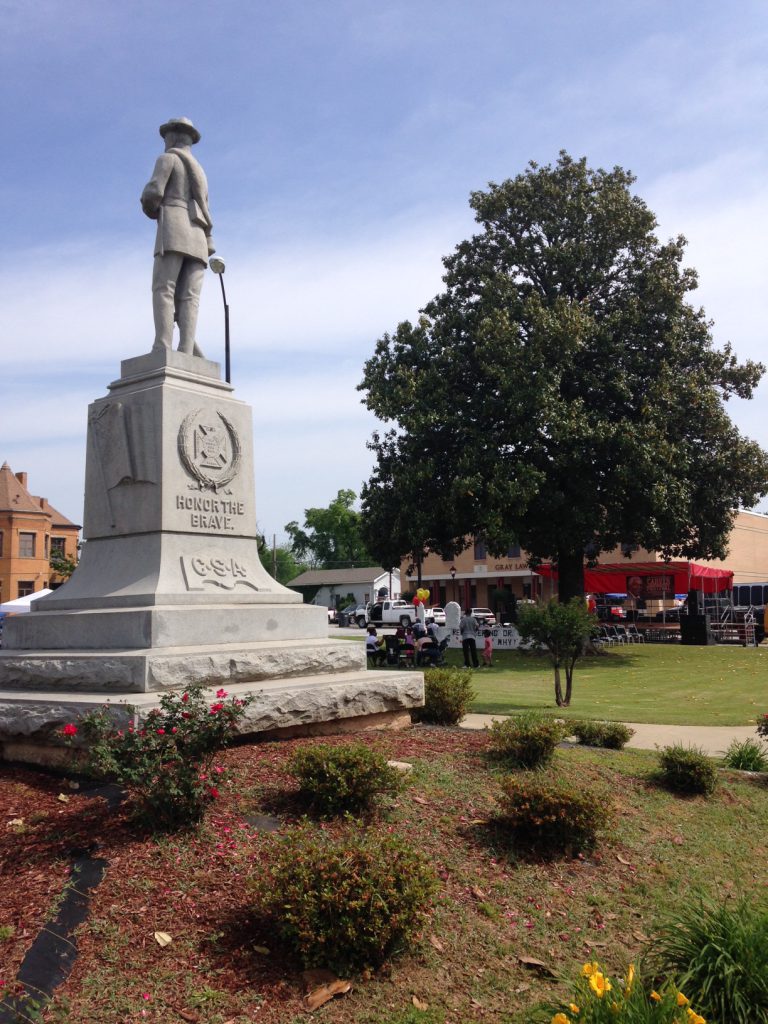
Town square in Tuskegee, Ala.
By Andy Brack, editor and publisher | It was uncomfortable to feel the piercing gaze of a stone Confederate soldier in the town square in Tuskegee, Ala., as African American residents set up tents to sell T-shirts, bracelets, food, candles, shea butter, books and bric-a-brac at an annual festival celebrating inventor George Washington Carver.
Most of the folks talking, laughing and having fun simply ignored the statue, as they had for generations. They seemed to know it was there (“Yeah,” one woman simply said when asked about it) but didn’t let it rain in their parade. Instead, there was much joy in the air in the town that is home to a historic jewel of education, Tuskegee University, founded in 1881.
In the 21st century in this town that’s 95 percent black, it certainly was an odd juxtaposition to have a Confederate monument on the town square just like similar ones found in hundreds of Southern towns. But the statue helped to generate a new perspective about recent talk in South Carolina from some about removing Civil War monuments now that the Confederate flag has been lowered on the Statehouse grounds.
Perhaps simply getting rid of them may not be the best thing, as some suggest. To take down these war monuments would — no pun intended — whitewash part of our history. Such memorials remind us of the past, just like the Palmetto tree on the state flag symbolizes our revolutionary past. Doesn’t keeping Confederate monuments in place, in fact, prompt us to remember the South’s troubled past — and how far Southerners have come? Rather than get bent out of shape by these carved links to history, wouldn’t it be better to address the continuing legacies of enduring poverty, inadequate education systems and problems that spawn from both?
While the Confederate statue in Tuskegee certainly looked out of place during the Carver Festival, perhaps it’s best to do what the people of Tuskegee do — take memorials like this with a grain of salt, use them as educational tools and get on with living now, not in the past.
On a related note, one of Tuskegee’s most famous natives was Rosa Parks, who wouldn’t give up her bus seat in 1955 to a white passenger. Hers was an act of civil disobedience that sparked the modern civil rights movement.
As Charleston works to build the International African American Museum, city fathers would be wise to visit the Troy University museum in Montgomery, Ala., that highlights Parks’ story. It offers a fascinating, interactive tour that allows visitors to understand the racism that Parks and fellow Montgomery residents encountered on a daily basis. And it offers a multimedia display that allows you feel part of that day in December 1955 that started the nation’s march towards equality.
When I left Charleston recently for a trip to Mississippi through Alabama, I didn’t expect to find the Carver Festival or to visit the Parks Museum. But both, it turns out, brought unanticipated pleasure and new thoughts. And both visits highlight the joy of travel.
- Have a comment? Send to: editor@charlestoncurrents.com.



 We Can Do Better, South Carolina!
We Can Do Better, South Carolina!
























